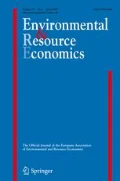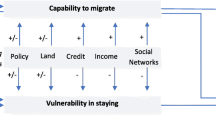Abstract
The economic value of environmental goods is commonly determined using the concepts of willingness to pay (WTP) or willingness to accept (WTA). However, the WTP/WTA observed in different countries (or between individuals) will differ according to socio-economic characteristics, in particular income. This notion of differentiated values for otherwise identical goods (say, a given reduction in mortality risk) has been criticized as unethical, most recently in the context of the 'social cost' chapter of the IPCC Second Assessment Report. These critics argue that, being a function of income, WTP/WTA estimates reflect the unfairness in the current income distribution, and for equity reasons uniform per-unit values should therefore be applied across individuals and countries. This paper analyses the role of equity in the aggregation of climate change damage estimates, using basic tools of welfare economics. It shows one way of how WTP/WTA estimates can be corrected in aggregation if the underlying income distribution is considered unfair. It proposes that in the aggregation process individual estimates be weighted with an equity factor derived from the social welfare and utility functions. Equity weighting can significantly increase aggregate (global) damage figures, although some specifications of weighting functions also imply reduced estimates. The paper also shows that while the postulate of uniform per-unit values is compatible with a wide range of 'reasonable' utility and welfare specifications, there are also cases where the common-value notion is not compatible with defensible welfare concepts.
Similar content being viewed by others
References
Arrow, K. (1951), Social Choice and Individual Values. New Haven, CT: Yale University Press.
Ayres, R. and J. Walter (1991), 'The Greenhouse Effect: Damages, Costs and Abatement', Environ-mental and Resource Economics 1, 237–270.
Blackorby, C., W. Bossert, and D. Donaldson (1995), 'Intertemporal Population Ethics: Critical-Level Utilitarian Principles', Econometrica 63(6), 1303–1320.
Boadway, R. and N. Bruce (1984), Welfare Economics. Cambridge, MA: Basil Blackwell.
Brekke, K. A., H. Luras, and K. Nyborg (1994), Sufficient Welfare Indicators. Allowing for Disagree-ment in Evaluations of Social Welfare, Discussion Paper No. 119. Oslo: Statistic Norway.
Burtraw, D. and R. J. Kopp (1994), Cost Benefit Analysis and International Environmental Policy Decision Making: Problems of Income Disparity, Discussion Paper 94–15. Washington, DC: Resources for the Future.
Cline, W. R. (1992), The Economics of Global Warming. Washingon, DC: Institute for International Economics.
Dreze, J. and N. Stern (1987), 'The Theory of Cost-Benefit Analysis', in A. J. Auerbach and M. Feldstein, eds., Handbook of Public Economics, Volume II. Amsterdam: North-Holland.
Ekins, P. (1995), 'Rethinking the Costs Related to Global Warming. A Survey of the Issues', Envi-ronmental and Resource Economics 5, 1–47.
Elster, J. (1992), Local and Global Justice. New York: Russell Sage Foundation.
Fankhauser, S. (1994), 'The Economic Costs of Global Warming Damage: A Survey', Global Envi-ronmental Change 4(4), 301–309.
Fankhauser, S. (1995), Valuing Climate Change. The Economics of the Greenhouse. London: Earth-scan.
Fankhauser, S., R. S. J. Tol and D.W. Pearce (1996), Extensions and Alternatives to Climate Change Damage Valuation. On the Critique of IPCC Working Group III, draft, Centre for Social and Economic Research on the Global Environment (CSERGE), University College London, and Institute for Environmental Studies, Vrije Universiteit, Amsterdam.
Fankhauser, S. and R. S. J. Tol (1995), The Social Costs of Climate Change: The IPCC Second Assessment Report and Beyond, Working Paper W-95/34, Institute for Environmental Studies, Vrije Universiteit, Amsterdam.
Flores, N. E. and R. T. Carson (1995), The Relationship between the Income Elasticities of Demand and Willingness to Pay. San Diego: Mimeo, Department of Economics, University of California.
Freeman, A. M. III (1993), The Measurement of Environmental and Resource Values. Theory and Methods. Washington, DC: Resources for the Future.
Hohmeyer, O. and M. Gartner (1992), The Costs of Climate Change. Report to the Commission of the European Communities, Fraunhofer Institut f¨ ur Systemtechnik und Innovationsforschung, Karlsruhe (Germany). IPCC (1996a), Climate Change 1995-Economic and Social Dimensions. Contribution of Working Group III to the Second Assessment Report of the Intergovernmental Panel on Climate Change. Cambridge: Cambridge University Press.
IPCC (1996b), Climate Change 1995-Impact, Adaptation and Mitigation of Climate Change-Scientific-Technic Analysis. Contribution of Working Group II to the Second Assessment Report of the Intergovernmental Panel on Climate Change. Cambridge: Cambridge University Press.
Johansson, P. O. (1993), Cost-Benefit Analysis of Environmental Change. Cambridge: Cambridge University Press.
Jones-Lee, M. W. and G. Loomes (1995), Valuing International Safety Externalities: Does the 'Golden Rule' Apply? Mimeo, University of Newcastle upon Tyne.
Kristrom, B. and P. Riera (1996), 'Is the Income Elasticity of Environmental Improvements Less Than One?', Environmental and Resource Economics 7, 45–55.
Krupnick, A., K. Harrison, E. Nickell, and M. Toman (1995), The Value of Health Benefits from Ambi-ent Air Quality Improvements in Central and Eastern Europe: An Exercise in Benefit Transfel, Discussion Paper ENR 93–19-REV. Washington DC: Resources for the Future (revised version, May).
Marglin, S., A. K. Sen, and P. Dasgupta (1972), Guidelines for Project Evaluation. Vienna: United Nations Industrial Development Organisation.
Meyer, A. and T. Cooper (1995), 'A Recalculation of the Social Costs of Climate Change', Working Paper, The Ecologist.
Nordhaus, W. D. (1991), 'To Slow or Not to Slow: The Economics of the Greenhouse Effect',Economic Journal 101(407), 920–937.
Pearce, D. W. (1971), Cost Benefit Analysis. Basingstoke: Macmillan (2nd edition 1986).
Pearce, D. W. (1980), 'The Social Incidence of Environmental Costs and Benefits', in T. O'Riordan and R. K. Turner, eds., Progress in Resource Management and Environmental Planning,Vol.2. Chichester: Wiley.
Pearce, D. W. and D. Ulph (1994), Discounting and the Early Deep Disposal of Radioactive Waste.A Report to United Kingdom NIREX Ltd, Centre for Social and Economic Research on the Global Environment, University College London and University of East Anglia, Norwich.
Squire, L. and H. van der Tak (1975), Economic Analysis of Projects. Baltimore: Johns Hopkins University Press.
Titus, J. G. (1992), 'The Cost of Climate Change to the United States', in S. K. Majumdar, L. S. Kalkstein, B. Yarnal, E. W. Miller, and L. M. Rosenfeld, eds., Global Climate Change: Implications Challenges and Mitigation Measures. Pennsylvania: Pennsylvania Academy of Science.
Tol, R. S. J. (1995), 'The Damage Costs of Climate Change-Toward More Comprehensive Calcu-lations', Environmental and Resource Economics 5, 353–374.
Author information
Authors and Affiliations
Rights and permissions
About this article
Cite this article
Fankhauser, S., Tol, R.S. & Pearce, D.W. The Aggregation of Climate Change Damages: a Welfare Theoretic Approach. Environmental and Resource Economics 10, 249–266 (1997). https://doi.org/10.1023/A:1026420425961
Issue Date:
DOI: https://doi.org/10.1023/A:1026420425961




